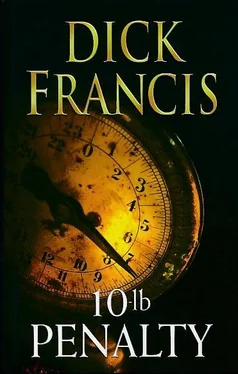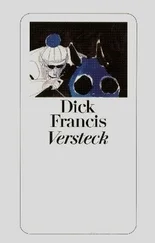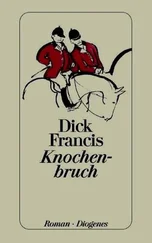Dick Francis - 10 lb Penalty
Здесь есть возможность читать онлайн «Dick Francis - 10 lb Penalty» весь текст электронной книги совершенно бесплатно (целиком полную версию без сокращений). В некоторых случаях можно слушать аудио, скачать через торрент в формате fb2 и присутствует краткое содержание. Город: London, Год выпуска: 1997, ISBN: 1997, Издательство: Michael Joseph, Жанр: Триллер, на английском языке. Описание произведения, (предисловие) а так же отзывы посетителей доступны на портале библиотеки ЛибКат.
- Название:10 lb Penalty
- Автор:
- Издательство:Michael Joseph
- Жанр:
- Год:1997
- Город:London
- ISBN:978-0-7181-4245-2
- Рейтинг книги:3 / 5. Голосов: 1
-
Избранное:Добавить в избранное
- Отзывы:
-
Ваша оценка:
- 60
- 1
- 2
- 3
- 4
- 5
10 lb Penalty: краткое содержание, описание и аннотация
Предлагаем к чтению аннотацию, описание, краткое содержание или предисловие (зависит от того, что написал сам автор книги «10 lb Penalty»). Если вы не нашли необходимую информацию о книге — напишите в комментариях, мы постараемся отыскать её.
10 lb Penalty — читать онлайн бесплатно полную книгу (весь текст) целиком
Ниже представлен текст книги, разбитый по страницам. Система сохранения места последней прочитанной страницы, позволяет с удобством читать онлайн бесплатно книгу «10 lb Penalty», без необходимости каждый раз заново искать на чём Вы остановились. Поставьте закладку, и сможете в любой момент перейти на страницу, на которой закончили чтение.
Интервал:
Закладка:
Up on the stage her stupid husband still looked self-satisfied.
A month ago, I thought, I hadn’t known the Bethunes existed.
Dearest Polly had bloomed unseen.
I hadn’t heard of Orinda, or of Alderney Wyvern.
I hadn’t met Mrs. Kitchens or her fanatical, unlovable Leonard, and I hadn’t known plump, efficient Mervyn or worried Crystal. I never did know the last names of Faith or Marge or Lavender, but I was certain even then that I would never forget the mean-spirited red-haired terror whose delight in life was to find out people’s hidden pleasures in order to destroy them. Bobby Usher bleeding Rudd.
Nine
So my father went to Westminster and I to Exeter, and the intense month we had spent in getting to know each other receded from a vivid present experience into a calmer, picture-filled memory.
I might not see him for weeks at a time but we talked now often on the telephone. Parliament was still in its summer recess. He would go back as a new boy, as I would, when my first term began.
Meantime I rode Sarah’s Future every morning under Stallworthy’s critical eye and can’t have done as badly as for Vivian Durridge because when I asked if he would enter the chestnut in a race for me — any race would do — he chose a novice ’chase at Wincanton on an inconspicuous Thursday and told me he hoped I’d be worth it as it was costing my father extras in the way of horse transport and shoeing with racing plates, not to mention the entry fee.
Laden thus half with glee and half with guilt, I went with Jim in his car to Wincanton, where Jim declared and saddled the horse and then watched him win with as much disbelief as I felt when I sailed past the post first.
“He flew!” I said, thrilled and astonished, as I unbuckled the saddle in the winner’s enclosure. “He was brilliant.”
“So I saw.”
Jim’s lack of much enthusiasm, I discovered, was rooted in his not having had the faith for a bet. Neither was Stallworthy overjoyed. All he said the next morning was, “You wasted the horse’s best win. You haven’t any sense. If I’d thought for a moment you would go to the front when the favorite fell, I’d have told you to keep the chestnut on a tight rein so we could have put the stable money on him next time out. What your father will say, I can’t imagine.”
What my father said was, “Very well done.”
“But nobody backed it...”
“Don’t you listen to Stallworthy. You listen to me. That horse is for you to do your best on. To win whenever you can. And don’t think I didn’t back it. I have an arrangement with a bookmaker that wherever — whenever — you ride in a race, I am betting on you at starting price. I won on you at twenties yesterday... I’m even learning racing jargon! Always try to win. Understand?”
I said “Yes” weakly.
“And I don’t care if you lose because some other horse is faster. Just keep to the rules and don’t break your neck.”
“OK.”
“Is there anything else you want?”
“Er...”
“You’ll get nowhere if you’re afraid to tell me.”
“I’m not exactly afraid,” I said.
“Well, then?”
“Well... will you telephone Stallworthy? Will you ask him to run your horse in the novice ’chase at Newton Abbot a week tomorrow? He’s entered him but now he won’t want to run him. He’ll say it’s too soon. He’ll say the horse will have to carry a 5-lb. penalty because I won on him yesterday.”
“And will he?”
“Yes, but there aren’t many more races — suitable races, that is — that I can ride him in before term starts. Stallworthy wants to win but I just want to race.”
“Yes, I know.” He paused. “I’ll fix it for Newton Abbot. Anything else?”
“Only... thanks.”
His laugh came down the wire. “Give my regards to Sarah’s Future.”
Feeling a bit foolish, I passed on the message to the chestnut, though in fact I had fallen into a habit of talking to him, sometimes aloud if we were alone, and sometimes in my mind. Although I had ridden a good many horses, he was the first I had known consistently from day to day. He fitted my body size and my level of skill. He undoubtedly recognized me and seemed almost to breathe a sigh of relief when I appeared every morning for exercise. We had won the race at Wincanton because we knew and trusted each other, and when I’d asked him for maximum speed at the end he’d understood from past experience what was needed, and had seemed positively to exult in having at last finished first.
Jim forgave the success and grew interested. Jim was by nature in tune with horses and, as I gradually realized, did most of the actual training. Stallworthy, although he watched the gallops most mornings, won his races with pen and entry forms, totting up times and weights and statistical probabilities.
Up the center of the long exercise field there were two rows of schooling fences, one of three flights of hurdles, and one of birch fences. Jim patiently spent some mornings teaching both me and the chestnut to go up over the birch with increasing precision, measuring our stride for takeoff from farther and farther back before the actual jump.
The riding I’d learned to that date had been from watching other people. Jim taught me, as it were, from inside, so that in that first month with Sarah’s Future I began to develop from an uncoordinated windmill with a head full of unrealistic dreams into a reasonably competent amateur rider.
Grumbling at great length about owners who knew nothing at all about racing and should leave all decisions to their trainer, Stallworthy complainingly sent the chestnut to carry his 5-lb. penalty at Newton Abbot.
I’d never before ridden on the course and at first sight of it felt foolish not to have listened to Stallworthy’s judgment. The steeplechase track was an almost one-and-a-half-mile flat circuit with sharpish turns, and the short grass gave little purchase on rock-hard ground, baked by the sun of August.
Stallworthy, with several other runners from his yard, had brought his critical eye to the course. Jim, saddling Sarah’s Future, told me the chestnut knew the course better than I did (I’d walked around it a couple of hours earlier to see the jumps, and the approaches to them, at close quarters) and to remember what I’d learned from him at home, and not to expect too much because of the weight disadvantage and because the other jockeys were all professionals, and that this was not an amateur race.
As usual, it was the speed that seduced me and fulfilled, and the fact that we finished third was enough to make my day worthwhile, though Stallworthy, who had incidentally also trained the winner, announced to me several times, “I told you so. I told your father it was too much to expect. Perhaps you’ll listen to me next time.”
“Never mind,” Jim consoled. “If you’d won today you’d have to have carried a 10-lb. penalty at Exeter races next Saturday, always supposing you can persuade the old man to let him run there, after this. He’ll say it’s too soon, which it probably is.”
The old man (Stallworthy) conducted a running battle over the telephone with my father.
My father won.
So, blisteringly, by six lengths, did Sarah’s Future, because the much longer galloping track, up on Halden Moor above Exeter, suited him better. He carried a 5-lb. penalty, not 10, and made light of it. The starting price, my father assured me later, would pay the training fees until Christmas.
Two days after that, in cooler blood, I went to learn mathematics.
My father learned back-bench tactics, but that wasn’t what the party had sent him to Hoopwestern for. He tried to explain it to me that the path upward led through the whip’s office, which sounded nastily about flagellation to me, though he laughed.
Читать дальшеИнтервал:
Закладка:
Похожие книги на «10 lb Penalty»
Представляем Вашему вниманию похожие книги на «10 lb Penalty» списком для выбора. Мы отобрали схожую по названию и смыслу литературу в надежде предоставить читателям больше вариантов отыскать новые, интересные, ещё непрочитанные произведения.
Обсуждение, отзывы о книге «10 lb Penalty» и просто собственные мнения читателей. Оставьте ваши комментарии, напишите, что Вы думаете о произведении, его смысле или главных героях. Укажите что конкретно понравилось, а что нет, и почему Вы так считаете.












